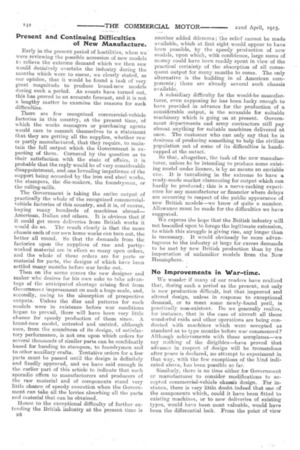Present and Continuing Difficulties of New Manufacture.
Page 2

If you've noticed an error in this article please click here to report it so we can fix it.
Early in the present period of hostilities, when we were reviewing the possible accession of new models to relieve the extreme demand which we then saw would decisively overtake the industry during the months which were to ensue, we clearly stated, as our opinion, that it would be found"a task of very great magnitude to produce brand-new models during such a period. As events have turned out, this has proved to an accurate forecast, and it is not a lengthy matter to examine the reasons for such difficulties.
There are few recognized commercial-vehicle factories in this country, at the present time, of which the works managers or purchasing agents would care to commit themselves to a statement that they are getting all the supplies, whether raw or partly manufactured, that they require, to maintain the full output which the Government is expecting of them. Cornered by the question as to their satisfaction with the state of affairs, it is probable that the reply would be of very considerable disappointment, undone 'revealing impatience of the support being accorded by the iron and steel works, the stompers, the die-makers, the foundrymen, or the rolling-mills.
The Government is taking the entire output of practically the whole of the recognized commercialvehicle factories of this country, and it is,. of course, buying many. hundreds of machines abroad— American, Italian and others. It is obvious that if it could get more deliveries from British works it would do so. The result clearly is that the more chassis each of our own home works can turn out, the better all round. So that the demands from the factories upon the suppliers of raw and partlyworked material are in effect so many open orders, and the whole of these orders are for parts or material for parts, the designs of which have been settled many months before war broke out.
Then on the scene comes the new designer and maker who desires for his own sake to take advantage of the anticipated shortage arising first from Government impressment on such a huge scale, and, secondly, owing to the absorption of prospective outputs. 'Unless the dies and patterns for such models were in existence before war conditions began to prevail, there will have been very little chance for speedy production of them since. A brand-new model, untested and untried, although sure, from the soundness of its design, of satisfactory performance, is not one upon which orders for several thousands of similar parts can be confidently based for handing to stompers, to laundrymen and to other auxiliary crafts. Tentative orders for a few parts must be passed until the design is definitely and fixedly approved, and we have said enough in the earlier part of this article to indicate that such sporadic offers to manufacturers and producers of the raw material and of components stand very little chance of speedy execution when the Government can take all the lorries absorbing all the parts and material that can be obtained.
Hence to the exceptional difficulty of further extending the British industry at the present time is another added dilemma; the relief cannot be made available, which at first sight would appear to have been possible, by the speedy production of new models, upon which, with confidence, large sums, of money could have been readily spent in view of the practical certainty of the absorption of all consequent output for many months to come. The only alternative is -the building in of American components; there are already several such chassis available.
A subsidiary difficulty for the would-be manufacturer, even supposins, he has been lucky enough to have provided in advance for the production of a considerable output, is the scramble for suitable machinery which is going on at present. Government departments and army contractors still pay almost anything for suitable machines delivered at once. The customer who can only say that he is desirous of producing something to help the civilian population out of some of its difficulties is handicapped at the outset.
So that, altogether, the task of the new manufacturer, unless he be intending to produce some existing model under licence, is by no means an enviable one. It is tantalizing in the extreme to have a ready-made market clamouring for output which can hardly be produced; this is a nerve-racking experience for any manufacturer or financier where delays are occurring in respect of the public appearance of new British models—we know of quite a. number. Allowance must be made for the difficulties we have suggested.
We express the hope that the British industry will not b.e.ealled upon-to forego the legitimate extension, to which this struggle is giving rise, any longer than is necessary. It would obviously be more adtantageous to the industry at large for excess demands to be met by new British production than by the importation of unfamiliar models from the New Hemisphere.




















